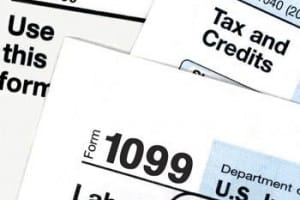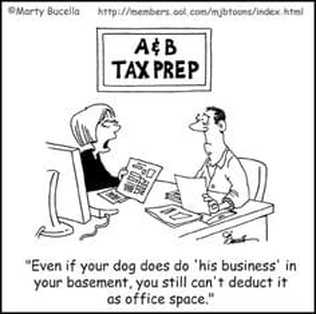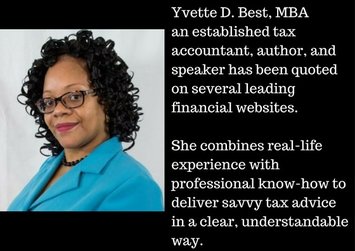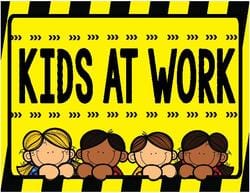 If you are running a home business, it is important to remember that there are tax deductions for you when tax season rolls around. Of course, you do not want to try to fool the IRS (no one wants to run the risk of being audited!), but you do want to take advantage of those deductions that are rightfully yours. Running your own home business takes much of the same expenses, effort, time, space, equipment, and travel as any other business. Below are some home business tax deductions to remember as April is drawing near. If you have a home office that is dedicated solely to your home business, you can add it to your list of home business deductions. The same goes for office supplies, furniture, software, subscriptions, and other equipment. Do not fear an audit for making these home business tax deductions as long as these items are used exclusively for your home business. If your business requires you to leave your home office, you can add the cost of travel, mileage, meals, entertainment, and anything else that goes along with the cost of living on the road to your home business tax deductions. During the year, make sure you keep documentation of your mileage, your trips, food, etc. Now, what about the really big stuff? Well, when making home business tax deductions, you can also take into consideration insurance premiums (if you are self-employed and pay for your own insurance), the money you deduct for retirement, and half of what you pay towards your social security. And if your children are 17 or younger and are working for you, you can deduct their salaries as business expenses. This is just a quick scan of the home business tax deductions you can take advantage of. For more information, schedule a consultation at http://www.yvettedbest.us to discuss your unique tax situation.
0 Comments
If you have children younger than 19 years old (or 24 if a full-time student) coordinate the filing of their taxes with yours. How they file is a matter of tax law.
The Problem Your child is away for college. You try to file your tax return on after finally receiving all the required documentation. Unfortunately, your e-filed tax return is rejected because your college student filed their own tax return and received a nice refund. Now you have a mess on your hands. You must submit an extension, file an amended tax return for your child, return a refund, and paper file your tax return. A Matter of Law The dependency rules and kiddie tax laws are clear and must be followed. If you have a dependent child as determined by the tax code, you will need to conduct the tax calculations to determine what is taxed at your child’s tax rate and what will be taxed at your higher rate. The same goes for the tax return that receives exemptions and standard deductions. This requires coordination of your tax filings with that of your dependent children. Suggestions
 It’s tax time again and you must be sure to receive all the necessary forms. What is a 1099 tax form and who gets one? A Tax Form 1099 is used to report income other than wages, salaries, and tips. Here of late, this term is used more and more frequently as many employers are opting to use contract labor versus hiring employees, who can turn out to be quite expensive when you factor in the insurance, payroll taxes, and other possible liability. If you had an independent contractor perform $600 more of services to you or your business, you are required by law to complete and deliver a 1099 form to that person or business. This article will take a look at the different 1099 tax forms, their purpose, who can receive one, and why. The 1099 tax forms, if you are the recipient, must be provided to you by January 31, 2017. Also, it must be furnished and filed by the company providing the form no later than January 31, 2017. But which 1099 form will you receive? If you are classified as an independent contractor (i.e. guest speaker, performer, Uber driver, etc.), or you receive income that is classified as non-employee income, or miscellaneous income (you were paid $600 or more) you will receive what is known as a 1099-Misc.; these are the information returns most often received for contract-for-hire work, leased workers, or general contractor payments for which there is not a direct sale as a merchant to a consumer. The other most often used 1099 tax form would come as a 1099-INT, this is 1099 received for interest income purposes; whether the income is from a bank or any lending institution, or from the sale of a seller-financed mortgage, the recipient of any income from interest will receive a 1099-INT. You would get a statement that summarizes your interest income for that year. This form is also used to report other tax items related to your interest income such as early withdrawal penalties, federal tax withheld and foreign tax paid. A close relative of the 1009-Int is the 1099-OID. This is an information return provided when you receive an original issue discount, usually from transactions related to mortgages served by the Federal Housing Authority. The 1099-DIV tax form is often used for investors. This tax form is sent to investors by brokers, mutual funds or the investment company. The form is a record of all taxable gains and dividends paid to an investor. The amounts that are stated on the form represent the value the fund companies are attributing to each investor’s investment return for the year. The amounts on the 1099-DIV could contain ordinary dividends, total capital gains, qualified dividends, foreign tax paid, federal income tax withheld, and foreign source income. Another 1099 can come as a 1099-B for barter exchange transactions. What does this mean? It means that instead of monetary payment, you received a bartered form of payment, an exchange of something other than money, with value attached to pay for a service. Other less used 1099’s are 1099-A, 1099-C, 1099-CAP, 1099-LTC, 1099-Q, 1099-R, and 1099-SA; the R, Q, and SA are for retirement and social security payments and are received by many retired individuals. The payments from IRAs, MSAs, Coverdell ESAs, and HSAs are reported on these 1099s. The 1099-A is received if there has been an acquisition of secured property or an abandonment of secured property. 1099-C is received if there is a cancellation of debt, as from a bankruptcy proceeding, credit card default, or another failure of a maker to make good on a debt that the lender or seller can use as a tax deduction. The 1099-CAP is a 1099 used to report significant changes in corporate control and capital structure. What does this mean in laymen’s terms? If you and several other individuals are in business together, as an incorporated entity, and 3 of you buy out another person, you will be required to furnish that individual with a 1099CAP so that the individual reports any income or gain from the capital sale of stock. A 1099 tax form that we’ve not seen very much until recently, but one that I’m sure we’ll see much more of in the not too distant future is the 1099-LTC. Long-term care and accelerated death benefits are filed on this 1099; with a larger segment of our population aging, this segment is also known as the “baby boomers” will make more use of long-term care insurance and payouts, and many of them will receive these types of 1099s. Although these are most often forms of taxable income to the recipient, this is not always a steadfast rule. For many of the older citizens, for individuals receiving the tax returns as part of a discounted program through the government, and for certain other situations, these are only information tax returns that do not result in added income tax liability. For the rest of us, however, a 1099 tax form usually means we have increased our income tax liability.  Do you realize that some tax forms ask you to check a box if you are BLIND? Quote: “Two years ago it was impossible to get through on the phone to the IRS. Now it's just hard to get through. That's progress.” -Charles Rossotti, former IRS Commissioner Disappointed that you never had time to write the great American novel? Don’t fret, just go dig out your past tax returns. Quote: "The Eiffel Tower is the Empire State Building after taxes." Under the Freedom of Information Act, a man with a small business sent a request to the IRS asking if they had a file on him. The IRS wrote back, “There is now.” Quote: “It would be nice if we could all pay our taxes with a smile, but normally cash is required.” Q: Who audits IRS agents? Quote: “Next to being shot at and missed, nothing is quite as satisfying as an income tax refund.” Q: How do you drive a CPA insane? A: Fill out Form 1040EZ. Quote: “The government deficit is the difference between the amount of money the government spends and the amount it has the nerve to collect." Why is it that when the IRS loses a tax return, it is considered a mistake, but when you lose a receipt, it is considered tax evasion? Quote: "The wages of sin are death, but by the time taxes are taken out, it's just sort of a tired feeling." Q: How do you humble a person that flaunts their wealth? A: Have them fill out a tax return. Quote: “Even when you make a tax form out on the level, you don't know when it's through if you are a crook or a martyr.” Q: Why is a tax audit like a tornado? A: There's a lot of screaming, and you end up losing your house. Quote: “When are we going to be allowed to list the government as a dependent?” People often say death and taxes are the same, but this is wrong. Death is a taxable event, but taxes never die. |
Archives
December 2017
Categories |



 RSS Feed
RSS Feed
